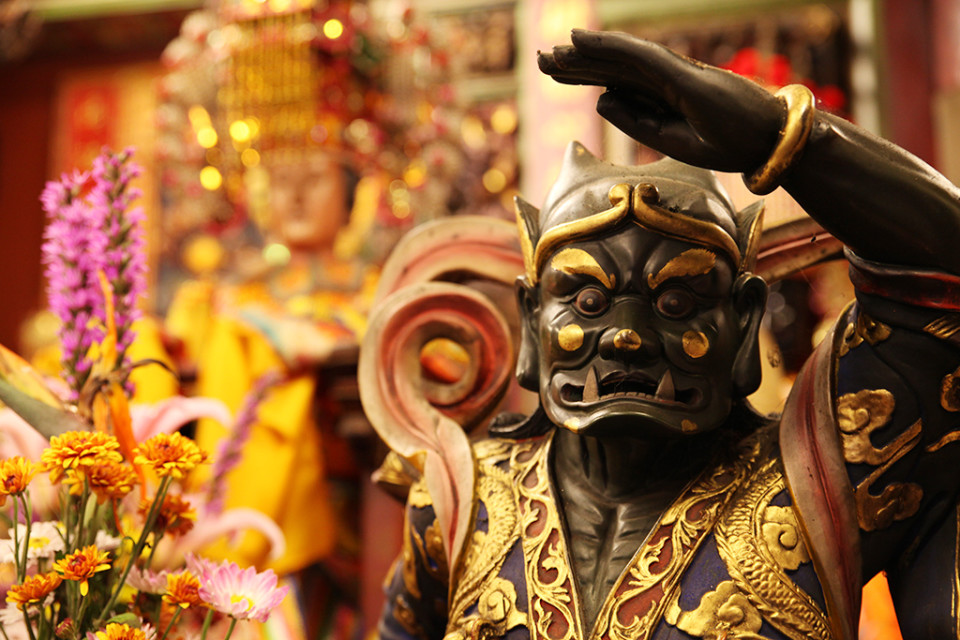“That’s the nuclear plant!? Really? No way!” exclaims Peace Boat participant, Ariyama Yoko as she steps out of the bus onto a small parking lot. Around her she can see an ornate entrance to a memorial park which gives way to the sea, a small street, some residential buildings and – a factory. Or rather a building which looks like a factory; three large cubes with a chimney. Inconspicuous altogether. “Indeed, this is Lungmen”, says Wang Shun-Wei quietly. “One of the most dangerous power plants in the world”. The Taiwanese activist, who has been a guest educator on Peace Boat, guides a small group to the fishing village of Gongliao, which is at the core of the Taiwanese anti-nuclear-movement. “Some people say this is the spot where Japan invaded Taiwan twice”, adds her colleague Hsu Aiya from the Taipei-based Green Citizen Action Alliance (GCAA). “In 1895 Japanese soldiers started half a century of colonialism, when they arrived on this beach” she explains as she points towards the memorial garden commemorating the 1895 invasion. “And now Japanese corporations [Mitsubishi, Hitachi and Toshiba] have exported their first nuclear power plant to the same place”.
Technically and logistically, Taiwan’s fourth nuclear power plant Lungmen has a chequered history. Its construction has been cancelled and resumed, delayed and divided into different units several times, so it becomes increasingly hard to oversee and to manage. The construction started in 2000 and was said to be completed in 2004, but is still not finished – “due to an array of mistakes in decision making”, as Shun-Wei Wang puts it. The US enterprise General Electricity (GE) received the contract, but the plant is built by Hitachi, Mitsubishi and Toshiba. “The parts are put together like a computer”, says Wang, “but we all know that a nuclear power plant is very different from a computer.” President Ma Ying-jeou defends the plan against serious concerns of international scientists and the World Nuclear Association.
Only pictures are left of what used to be a long golden beach. Gongliao’s coast is spotted with litter, the sand has been removed and a large port constructed to import the uranium fuel. A dozen sticks stand out of the water some hundred metres from the shore. “They mark the site where tubes will be laid to release the cooling water from the reactors back to the sea”, Hsu Aiya explains. “Originally they were closer to the beach, but as a reaction to local protests they put them a little further away. But this doesn’t help anything. Nearly half of the residents of Gongliao village are fishermen, who can no longer sustain their livelihood since the coast became a construction site.” As the warm cooling water will be discharged into the sea via a large system of tubes, local fishermen have to switch to deeper, more dangerous fishing grounds.
Ever since the project was launched in 1988, the villagers opposed it strongly. In 1990 they founded a self-help group, which still exists. Yang Kuei-Ying, one of the founding members, welcomes the Peace Boat participants in a modest meeting room decorated with posters bearing anti-nuclear message- their office. She was a young woman selling swimsuits in her shop at the coastline, when the government plan started to threaten her home. Although nobody in the group has a university education, they have acquired the technical and juridical knowledge necessary to negotiate with government officials and the state-owned Taipower company. GCAA provides them with information, as they are doing with other affected villages. “But we do not interfere in their decisions and reactions”, emphasizes Wang Shun-Wei. “We act as a bridge between the government and the local people.” In a referendum, 96 per cent of the Gongliao inhabitants voted against the nuclear power plant. The group maintains friendly relations with the workers of the nuclear power plant; some of them inform them about the latest problems in the construction – data which GCAA uses to argue and negotiate with the government, as Hsu Aiya explains smiling. “The workers do their job to earn a living, but they are not loyal towards the nuclear industry”.
How have these villagers managed to uphold their protest for nearly one generation? The largest temple in Gongliao might hold an answer to this question. It is dedicated to Mazu, the goddess of the fishermen. Whenever the early activists went to a protest in front of the parliament or the presidential hall in Taipei, they asked Mazu to join them. If she agreed, they took her statue with them to the street, and her presence encouraged them considerably. However, during the meeting with Peace Boat, Matsu seems to be absent. The Taiwanese talk little of their own struggles; instead they want to know every detail about Fukushima. It seems that they are preparing for the worst case scenario. Did the real estate prices decrease after the accident? – Yes, considerably. – How were they informed? – Inconsistently. – Was the Fukushima plant located as close to houses as in Taiwan? – No. Wen-Chang Wu, a businessman and new elected chairperson of the self-help group, looks tired and worried. “Has any ‘decontamination’ taken place in Fukushima?” he asks. “Our government keeps telling us, they would simply decontaminate our village if an accident were to happen”. Tsuneo Suzuki shakes his head. “Decontamination is a myth. You can clean the remnants of a tsunami, but you cannot get rid of radiation.”
They eat their fish soup in silence. “Sometimes I feel really depressed”, admits Wu Yu-Hua, who owns a small restaurant in Gongliao. “We have been repeating the same concerns for 20 years now. But the government will just not listen.” Suddenly she smiles. “But we will fight until the last minute.” Some time ago the villagers have asked Mazu whether the power plant will start its operation or not. It might be built and might be completed, the goddess spoke. But it will never go into operation.
